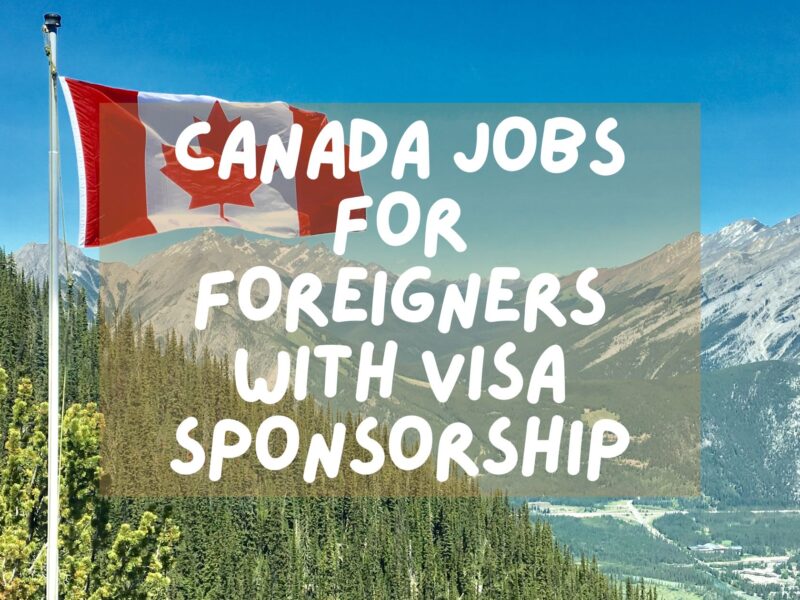Canada has long been recognized as a top destination for immigrants seeking better job opportunities and a higher quality of life. With its diverse economy and a strong demand for skilled labor, Canada offers numerous job opportunities for foreigners, many of which come with the possibility of visa sponsorship. This means that foreign workers can secure employment while also obtaining the necessary legal authorization to live and work in Canada. Understanding the job market and the process involved in securing a position with visa sponsorship is critical for those looking to make Canada their new home.
The Canadian job market is characterized by its openness to international talent, particularly in sectors experiencing labor shortages. Industries such as technology, healthcare, engineering, and skilled trades are actively seeking skilled workers from abroad. This demand has led to various immigration programs designed to facilitate the entry of foreign workers into the Canadian workforce. By offering visa sponsorship, employers can attract the best talent from around the world, creating a mutually beneficial relationship that supports both the company and the immigrant worker.
In this article, we will explore the types of jobs available to foreigners in Canada that offer visa sponsorship, focusing on entry-level positions that are accessible to immigrants. We will also discuss visa requirements, salary scales, application processes, and potential challenges in securing sponsorship. By providing comprehensive information, we aim to empower prospective immigrants with the knowledge they need to navigate the Canadian job market effectively.
Entry Level Jobs for Immigrants
1. Hospitality and Food Service
The hospitality and food service industry is one of the largest employers in Canada, offering numerous entry-level positions suitable for immigrants. Roles such as servers, kitchen staff, and hotel housekeeping are in high demand, particularly in metropolitan areas and tourist destinations. These positions typically require strong interpersonal skills, the ability to work in fast-paced environments, and a friendly demeanor. Many employers in this sector are willing to provide training and support, making it an excellent entry point for newcomers.
Salaries in the hospitality industry can vary widely depending on the location and type of establishment. For example, entry-level servers in popular restaurants may earn a base salary plus tips, significantly increasing their overall income. On average, entry-level positions in hospitality can offer salaries ranging from CAD 30,000 to CAD 45,000 annually. As immigrants gain experience and develop their skills, they can advance to supervisory or management roles, which often come with higher salaries and additional responsibilities.
2. Manufacturing and Warehousing
The manufacturing and warehousing sectors are crucial components of the Canadian economy, providing a wide array of entry-level job opportunities for foreign workers. Positions such as assembly line workers, warehouse associates, and machine operators are commonly available. These roles typically require physical stamina, attention to detail, and the ability to follow safety protocols. Many companies in this sector are actively seeking foreign workers and may offer visa sponsorship to fill these essential positions.
Salaries in manufacturing and warehousing can vary based on the specific job and location. Entry-level positions in these sectors generally offer salaries ranging from CAD 35,000 to CAD 50,000 per year. As workers gain experience and potentially obtain certifications in specialized areas, they can move into higher-paying roles, such as team leaders or skilled trades positions. The manufacturing and warehousing sectors also often provide opportunities for overtime, which can further increase earnings.
3. Construction and Skilled Trades
The construction industry in Canada is booming, with a significant demand for skilled labor. Entry-level positions such as construction laborers, carpenters’ assistants, and electricians’ helpers are in high demand. These roles typically require physical strength, the ability to work outdoors, and a willingness to learn. Many construction companies are eager to hire foreign workers and may offer visa sponsorship to fill these critical positions, especially in regions experiencing rapid development.
Salaries in the construction sector can vary widely based on the specific role and region. Entry-level construction laborers can expect to earn between CAD 40,000 and CAD 60,000 annually. As workers gain experience and complete apprenticeship programs, they can advance to higher-paying positions within the skilled trades, often earning well over CAD 80,000 per year. This sector not only offers competitive salaries but also the potential for long-term career growth.
4. Healthcare Support Roles
The healthcare industry in Canada is rapidly growing, with a significant demand for support staff to assist healthcare professionals. Entry-level positions such as personal support workers (PSWs), healthcare aides, and medical office assistants are commonly available. These roles typically require compassion, patience, and a basic understanding of healthcare practices. Many healthcare employers are willing to sponsor foreign workers to fill these essential roles, particularly in regions with aging populations and increasing healthcare needs.
Salaries for entry-level healthcare support roles can vary based on the specific position and location. On average, personal support workers can expect salaries ranging from CAD 35,000 to CAD 50,000 per year. As workers gain experience and pursue further education or certifications, they can advance into specialized roles within the healthcare field, which often come with higher salaries and increased responsibilities. The healthcare sector not only offers competitive pay but also the opportunity to make a meaningful impact on people’s lives.
Visa Requirements for Employment
To work in Canada, foreign nationals typically need to obtain a work permit, which allows them to live and work legally in the country. The process for obtaining a work permit can vary depending on the type of job and the employer’s needs. Here are the key visa requirements for employment in Canada:
- Job Offer: Most work permits require a valid job offer from a Canadian employer. The employer may need to demonstrate that they were unable to find a local candidate for the position, often through a Labour Market Impact Assessment (LMIA).
- Labour Market Impact Assessment (LMIA): An LMIA is a document that employers may need to obtain to hire a foreign worker. It proves that hiring a foreign worker will not negatively impact the Canadian labor market.
- Visa Application: Applicants must fill out a work permit application form and submit it to the appropriate Canadian authorities, along with a processing fee.
- Supporting Documents: Commonly required documents include a valid passport, proof of qualifications or work experience, a signed employment contract, and, in some cases, a medical examination.
- Background Checks: Applicants may need to undergo background checks, including a criminal record check, as part of the visa application process.
- Language Proficiency: Some employers may require proof of proficiency in English or French, particularly for positions involving customer interaction.
It’s essential for prospective immigrants to research the specific visa requirements for their desired job and ensure they meet all necessary criteria.
Salary Scale for Immigrants
| Job Title | Entry-Level Salary (CAD) | Mid-Level Salary (CAD) | Senior-Level Salary (CAD) |
|---|---|---|---|
| Hospitality Staff | 30,000 – 45,000 | 45,000 – 60,000 | 60,000 – 80,000 |
| Manufacturing/Warehousing | 35,000 – 50,000 | 50,000 – 65,000 | 65,000 – 85,000 |
| Construction Laborers Healthcare Support Roles | 40,000 – 60,000 35,000 – 50,000 | 60,000 – 80,000 50,000 – 65,000 | 80,000 – 100,000 65,000 – 85,000 |
Application Requirements and Documents
When applying for jobs in Canada, foreign workers need to prepare a comprehensive application package. This typically includes the following documents:
- Resume/CV: A well-structured resume that highlights relevant experience, skills, and education. It is essential to tailor the resume to each specific job application, emphasizing qualifications that align with the job description.
- Cover Letter: A personalized cover letter that introduces the applicant and explains their interest in the position. It should detail how their background and skills make them a suitable candidate for the role.
- Proof of Qualifications: Depending on the job, applicants may need to provide evidence of their qualifications, such as degrees, diplomas, or certificates. It’s crucial to ensure that any foreign qualifications are recognized in Canada, which may involve obtaining an Educational Credential Assessment (ECA).
- References: Contact information for professional references who can vouch for the applicant’s work ethic and skills. References from previous employers or supervisors are typically preferred.
- Work Permit/Visa Documentation: If applicable, documentation related to the work permit or visa application should be included. This may consist of a copy of the job offer, proof of application submission, or any other relevant documents required by immigration authorities.
- Language Proficiency Certificates: If the job requires proficiency in English or French, applicants may need to provide proof of language skills through standardized tests, such as the IELTS or CELPIP for English or TEF for French.
It is essential for applicants to ensure that all documents are accurate, complete, and professionally presented. Many employers appreciate a well-organized application, which can reflect positively on the candidate’s attention to detail.
Employment Websites to Find Opportunities
Several online platforms cater specifically to job seekers in Canada, making it easier for foreigners to find job opportunities that offer visa sponsorship. Some of the most popular employment websites include:
- Job Bank: The Government of Canada’s official job site offers a comprehensive listing of job opportunities across various sectors. Job seekers can search for positions by location, industry, and job type, making it a valuable resource for finding visa-sponsored roles.
- Indeed Canada: A widely used job search engine that aggregates listings from various sources, including company websites and job boards. Users can filter searches based on salary, job type, and location, making it an excellent tool for finding opportunities.
- LinkedIn: This professional networking platform also features a robust job search function. Job seekers can create profiles, connect with industry professionals, and apply for jobs directly through the platform, often with the option to indicate their interest in visa sponsorship.
- Glassdoor: Known for its company reviews, Glassdoor also offers job listings and salary information. This platform allows job seekers to gain insights into company culture, interview processes, and employee experiences, which can be beneficial when deciding where to apply.
- Monster Canada: A job search website that provides a variety of resources, including career advice and resume tips. Monster allows users to search for jobs by industry and location and offers tools to help job seekers enhance their applications.
- Workopolis: One of Canada’s leading job boards, Workopolis features a wide range of job listings and offers resources for job seekers, including career advice and salary information.
Step-by-Step Guide to Applying for Jobs
Navigating the job application process can be daunting for immigrants, but following a structured approach can increase the chances of success. Here’s a step-by-step guide to applying for jobs in Canada:
- Research Job Opportunities: Start by exploring various job boards and company websites to identify positions that match your skills and experience. Make a list of potential employers and job openings that interest you.
- Tailor Your Resume and Cover Letter: Customize your resume and cover letter for each application. Highlight relevant experience, skills, and accomplishments that align with the job description. Use keywords from the job posting to increase the chances of your application being noticed.
- Prepare Required Documents: Gather all necessary documents, including your resume, cover letter, proof of qualifications, references, and any visa-related documentation. Ensure that all documents are formatted professionally and free of errors.
- Submit Your Application: Follow the application instructions provided by the employer. This may involve submitting your application through an online portal, via email, or in person. Ensure that you meet all deadlines and provide all requested information.
- Follow Up: After submitting your application, consider sending a polite follow-up email to express your continued interest in the position. This demonstrates initiative and can help keep your application top of mind for the employer.
- Prepare for Interviews: If selected for an interview, research the company and practice common interview questions. Be ready to discuss your qualifications and how you can contribute to the organization. Dress professionally and arrive on time for the interview.
- Negotiate Offers: If you receive a job offer, carefully review the terms and consider negotiating salary and benefits if necessary. Research industry standards to ensure that the offer is competitive.
Potential Challenges in Securing Sponsorship
While many employers in Canada are open to hiring foreign workers, securing visa sponsorship can pose challenges. Here are some potential hurdles that immigrants may face:
- Complex Visa Processes: The visa application process can be complex and time-consuming. Each immigration program has specific regulations and requirements, which can vary significantly. Immigrants must be diligent in understanding the specific requirements for their chosen destination.
- Employer Reluctance: Some employers may be hesitant to sponsor visas due to the perceived administrative burden or the need to prove that no local candidates are available for the position. This can make it challenging for immigrants to find opportunities that offer sponsorship.
- Language Barriers: Proficiency in English or French is often a requirement for many jobs, even in entry-level positions. Non-native speakers may face challenges in communication, which can affect their job prospects.
- Cultural Differences: Adapting to a new work culture can be challenging for immigrants. Understanding workplace norms, expectations, and communication styles is crucial for success in a new environment.
- Recognition of Foreign Experience: Some employers may not fully recognize or value foreign work experience, making it essential for immigrants to effectively communicate their skills and qualifications during the application process.
Conclusion
Canada presents a wealth of job opportunities for foreigners seeking employment with visa sponsorship. From hospitality and manufacturing to construction and healthcare, there are numerous entry-level roles available for immigrants looking to establish their careers in a new country. Understanding the visa requirements, salary scales, and application processes is vital for successful job hunting.
By utilizing online resources, tailoring applications, and preparing for interviews, immigrants can enhance their chances of securing employment in Canada. While challenges may arise, the rewards of working in a diverse and dynamic environment make the effort worthwhile.










